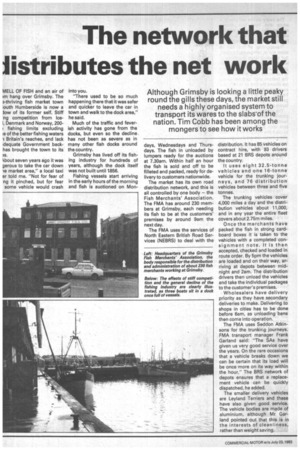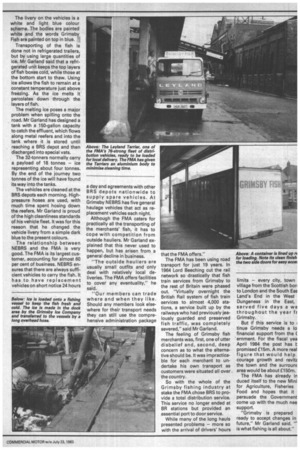The network that iistributes the net work
Page 30

Page 31

If you've noticed an error in this article please click here to report it so we can fix it.
MELL OF FISH and an air of om hang over Grimsby. The a-thriving fish market town ,outh Humberside is now a low of its former self. Stiff ng competition from IceI, Denmark and Norway, 200 fishing limits excluding le of the better fishing waters Britain's reaches, and lack idequate Government backhas brought the town to its as.
\bout seven years ago it was gerous to take the car down le market area," a local taxi er told me. "Not for fear of ng it pinched, but for fear some vehicle would crash into you.
"There used to be so much happening there that it was safer and quicker to leave the car in town and walk to the dock area," he said.
Much of the traffic and feverish activity has gone from the docks, but even so the decline has not been as severe as in many other fish docks around the country.
Grimsby has lived off its fishing industry for hundreds of years, although the dock itself was not built until '1856.
Fishing vessels start arriving in the early hours of the morning and fish is auctioned on Mon
days, Wednesdays and Thursdays. The fish in unloaded by lumbers ready for the auctions at 7.30am. Within half an hour the fish is sold and off to be filleted and packed, ready for delivery to customers nationwide.
The market has its own road distribution network, and this is all controlled by one body — the Fish Merchants' Association. The FMA has around 230 members at Grimsby, each needing its fish to be at the customers' premises by around 9am the next day.
The FMA uses the services of North Eastern British Road Services (NEBRS) to deal with the distribution. It has 85 vehicles on contract hire, with 93 drivers based at 21 BRS depots around the country.
It uses eight 32.5-tonne vehicles and one 1 6-tonne vehicle for the trunking journeys, and 76 distribution vehicles between three and five tonnes.
The trunking vehicles cover 4,000 miles a day and the distribution vehicles about 11,000, and in any year the entire fleet covers about 2.75m miles.
Once the merchants have packed the fish in strong cardboard boxes it is taken to the vehicles with a completed consignment note. It is then accepted, checked and loaded in route order. By 5pm the vehicles are loaded and on their way, arriving at depots between midnight and 2am. The distribution drivers then unload the vehicles and take the individual packages. to the customer's premises.
Wholesalers have delivery priority as they have secondary deliveries to make. Delivering to shops in cities has to be done before 6am, as unloading bans then come into operation.
The FMA uses Seddon Atkinsons for the trunking journeys. FMA transport manager Frank Garland said: "The SAs have given us very good service over the years. On the rare occasions that a vehicle breaks down we can be certain that its load will be once more on its way within the hour." The BRS network of depots ensures that a replacement vehicle can be quickly dispatched, he added.
The smaller delivery vehicles are Leyland Terriers and these have also given good service. The vehicle bodies are made of aluminium, although Mr Garland pointed out that this is in the interests of cleanliness, rather than weight saving. The livery on the vehicles is a white and light blue colour scheme. The bodies are painted white and the words Grimsby Fish are painted on top in blue.
Transporting of the fish is done not in refrigerated trailers, but by using large quantities of ice. Mr Garland said that a refrigerated unit keeps the top layers of fish boxes cold, while those at the bottom start to thaw. Using ice allows the fish to remain at a constant temperature just above freezing. As the ice melts it percolates down through the layers of fish.
The melting ice poses a major problem when spilling onto the road. Mr Garland has designed a tank with a 150-gallon capacity to catch the effluent, which flows along metal reefers and into the tank where it is stored until reaching a BRS depot and then discharged into special vats.
The 32-toriners normally carry a payload of 18 tonnes — ice representing about four tonnes. By the end of the journey two tonnes of the ice will have found its way into the tanks.
The vehicles are cleaned at the BRS depots each morning. Highpressure hoses are used, with much time spent hosing down the reefers. Mr Garland is proud of the high cleanliness standards of his vehicle fleet. It was for this reason that he changed the vehicle livery from a simple dark blue to the present colours.
The relationship between NEBRS and the FMA is very good. The FMA is its largest customer, accounting for almost 60 per cent of business. NEBRS ensures that there are always sufficient vehicles to carry the fish. It has to have replacement vehicles on short notice 24 hours a day and agreements with other BRS depots nationwide to supply spare vehicles. At Grimsby NEBRS has five general haulage vehicles that act as replacement vehicles each night.
Although the FMA caters for practically all the transporting of the merchants' fish, it has to cope with competition from outside hauliers. Mr Garland explained that this never used to happen, but has arisen from a general decline in business.
"The outside hauliers are usually small outfits and only deal with relatively local deliveries. The FMA offers facilities to cover any eventuality," he said.
"Our members can trade where and when they like. Should any members look elsewhere for their transport needs they can still use the comprehensive administration package The FMA has been using road transport for just 19 years. In 1964 Lord Beeching cut the rail network so drastically that fish train services from Grimsby to the rest of Britain were phased out. "Virtually overnight the British Rail system of fish train services to almost 4,000 stations, a service built up by the railways who had previously jealously guarded and preserved fish traffic, was completely severed," said Mr Garland.
The feeling of Grimsby fish merchants was, first, one of utter disbelief and, second, deep concern as to what the alternative should be. It was impracticable for each merchant to undertake his own transport as customers were situated all over the country.
So with the whole of the Grimsby fishing industry at stake the FMA chose BRS to provide a total distribution service. This service no longer ended at BR stations but provided an essential port to door service.
While many of the long hauls presented problems — more so with the arrival of drivers' hours limits — every city, town village from the Scottish bon to London and the South Eas Land's End in the West Dungeness in the East, served five days a we throughout the year fr Grimsby.
But if this service is to tinue Grimsby needs a lo financial support from the ernment. For the fiscal yea April 1984 the post has L promised £15m. A more real figure that would help courage growth and revits the town and the surrounc area would be about f150m.
The FMA has already in duced itself to the new Mini for Agriculture, Fisheries Food and hopes that it persuade the Government come up with the much nee support.
"Grimsby is prepared ready to accept changes in future," Mr Garland said. "is what fishing is all about."




















































































